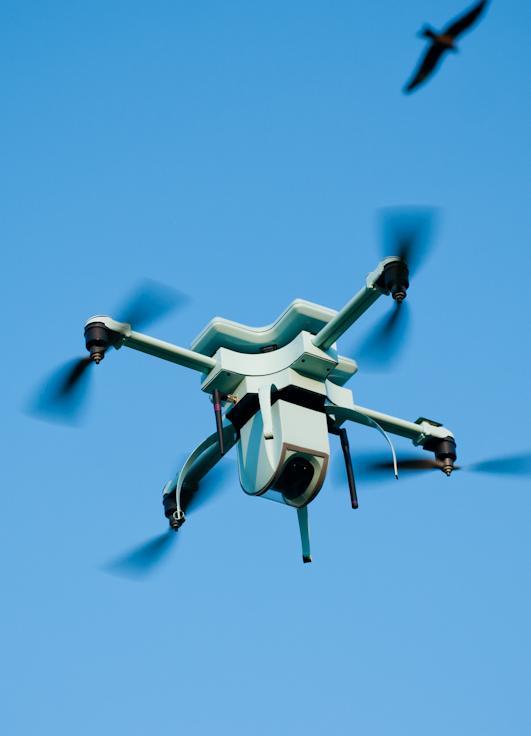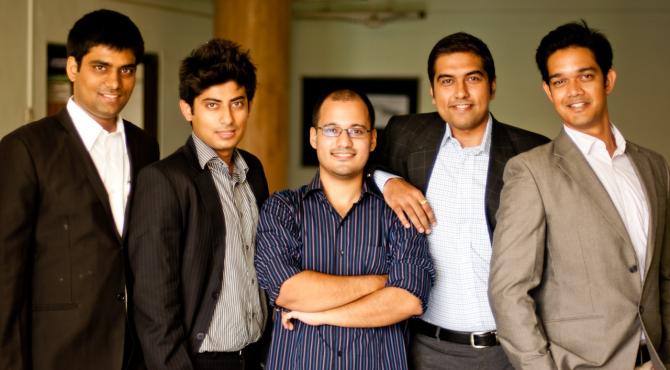 | « Back to article | Print this article |
'We don't make UAVs just to earn money and fame'
We didn’t have much money. We are all first generation entrepreneurs,” says Ankit Mehta, co-founder and CEO of Ideaforge, a company that makes unmanned aerial vehicles.
In 2007, there weren’t many venture capitalists willing to bet their money on a company that dreamt of making UAVs, whatever its technological prowess.
Ankit is an IIT Bombay alumnus (BTech and MTech in Mechanical Engineering with specialisation in computer-aided design and automation).
His co-founders, Rahul Singh, and Ashish Bhat, are both from IIT Bombay with B Tech in Mechanical and Electrical Engineering respectively. Vipul Joshi, Ankit’s childhood friend, is an MBA graduate from the University of Business and Finance, Switzerland. Amardeep Singh has done his BTech and MTech (dual degree) in Aerospace Engineering from IIT Bombay.
When Ideaforge started in 2007, IIT-B was looking to outsource some data logging systems for their mini and micro UAVs from projects they had from the India’s premier Defence Research and Development Organisation (DRDO).
They knew about Ideaforge’s history in being able to deliver electronics and so IIT-B asked Ankit and his team to join forces.
Ideaforge finished the project on time. Encouraged by the results, IIT-B and DRDO told Ideaforge to make a UAV on an experimental basis for them.
Ideaforge had another feather in its cap. In 2008, it participated in a competition with IIT-B called MAV (micro aerial vehicles), jointly held by the United States Department of Defence and the Indian Army.
“There, in the VTOL (vertical take off and landing) category we were joint winners with the Massachusetts Institute of Technology, US,” says Ankit proudly.
DRDO’s interest in the UAVs was whetted further and that resulted in a contract with the defence establishment for Ideaforge.
Ideaforge has sold 70 UAVs since then, each more advanced in functions than the previous one. The UAVs are used in reconnaissance, intelligence gathering and surveillance in border areas. They were used for rescue and relief operations during the disastrous Uttarakhand floods last year.
In this interview with Rediff.com, Ankit Mehta and Vipul Joshi spoke about team-building, challenges faced, their dreams, aspirations and success mantras.
Were you afraid of failure when you started up?
Ankit: We were never afraid because we were very confident of our ability to deliver on the technology side. We also knew that we had the right kind of platform and education to be able to survive even if this enterprise did not survive.
Vipul: The fear of not trying and doing something like what we were doing scared us more than the fear of failure. The excitement of doing something very innovative, path-breaking and getting into a certain place was more than the negativity of it.
Ankit: We were in control of the situation at that point in time. Everyone in the team was willing to face the consequences. These things influence your decisions and give you courage that if we all stick together we can deliver the results.
Pros and cons of working in teams…
Ankit: As much as possible, different team members should have complementary roles. If your responsibility areas clash too much then there are too many ego clashes.
But if they are complementary, then team members act as different spokes in the same wheel.
Vipul: Teams even help you sail through difficult times. Alone, you would die down soon.
Ankit: In a team you will have people who are very positive, not so positive, and even very negative about a given opportunity. So, you will always have people who will pull the team’s energy up and that energy pulls you out of difficult times.
Another important thing for a team is to have clear leadership. Without it, conflict resolution can become an issue. There will still be conflicts, but if you have good leadership definition within the team, that helps tremendously in resolving conflicts.
The leadership definition could be as simple as the person whose responsibility a particular decision is, is the leader of that decision. You don’t need a senior team leader always taking decisions or dictating the terms.
Vipul: Ego issues arise because of discontent with the role you have. If the aspiration is ‘I should be the CFO or CEO of the company’ and not the person who is right there at that moment, then ego issues crop up.
Just do what you are good at and you will deliver, rather than aspiring for what you can’t be.
'We want to create a product, technology that lives beyond us'
What is the driving factor for this enterprise?
Ankit: We want to see our systems out there. We want to see people using them, everywhere. We want to inspire our end customers, consumers, to induct these modern technologies in their daily activities.
Vipul: The most common driving factor has been that we create a product, technology that lives beyond us. I think the whole inspiration of why we want to be entrepreneurs came from this thought. We want our systems to be there beyond the next five or ten or fifty years.
What challenges did you face in the initial phase as a start-up?
Ankit: Nobody believes in funding hardware in India. And, whoever wants to fund hardware wants to be completely protected with iron-tight patents.
How do you expect people to have patents even before you are willing to support them or believe in their talent and capability by looking at what they have done?
Getting seed capital was a big challenge for IdeaForge. People were not willing to give us money because they wanted us to be a level or two ahead of where we were. And we couldn’t reach that level because we didn’t have that kind of money to execute our ideas or get to that level.
Vipul: At the time we started IdeaForge, start-ups were still a niche concept. Today, you will find start-up programmes, incubation centres, seed fund capitalists, venture funding and all that, but six years ago all that was alien.
Family members could not understand why you wanted to start up on your own when high-paying jobs were making their presence felt at the IITs and IIMs.
Access to markets was also a challenge and then penetrating the market was also challenging. Finding the right channel partners to sell UAVs across a geography that is as vast as India when you are a very small player was also a challenge.
How did you convince your backers?
Ankit: Typically, investors invest in a team. It was easy convincing investors because of the sheer quality of the team we had assembled. The kind of achievements the team had, actively working on competitions and projects when we were at IIT, boosted confidence in us.
Our technological prowess helped us convince the people about our ability to deliver as far as technology and products were concerned.
How did you convince your parents about what you were doing?
Ankit: We are looking at long-term value and they obviously expected more short-term value. That disconnect will always be there until we reach our long-term goals by remaining adamant.
Vipul: In their hearts they are very proud of what we do. What we did in Uttarakhand reiterates the fact that we are not in this business only for commercial value.
Ankit: One of our proudest moments was when one of our systems was displayed on the DRDO tableau on Republic Day this year. Achievements like these make them very proud about what we are doing.
'We want to create a product, technology that lives beyond us'
How did you sell your first UAV?
Ankit: The first piece was sold to an Indian state’s special task force in early 2010. Since then we have sold 70 such pieces.
In 2009 we attended DEFEXPO and demonstrated Netra.We were the only company doing a live demonstration there, flying our systems during the event.
A German soldier who had used another UAV available in their local market was mighty impressed when he flew our UAV. He said, ‘This is crazy! How can you do this?!’
Our focus has always been on how to make our UAVs extremely user-friendly while keeping the system safe. Within that we were the first company to allow dynamic waypoint navigation, which allows users to change direction on the fly from wherever the UAV was flying.
That is why selling the first system was never a real chore for us. Users loved the way we were able to operate the system. The quality of our imagery was such that they could actually see an immediate connect between ground station and what the UAV was seeing while flying.
What is your mantra for success?
Ankit: For us, success isn’t just about earning a lot of money.
Success is also about people appreciating and acknowledging your endeavours.
It is also about people knowing who you are. It is also about influencing the way in which a certain technology is evolving.
Duriung the Uttarakhand disaster, we volunteered to do the entire UAV operations on our own once we were called by the Disaster Response Force.
Within 24 hours of receiving the call, we reached the location for UAV deployment from Mumbai. That is the kind of commitment and seriousness we have towards what we are doing.
We know that our systems can add value to the operations of various forces in the country, operations while dealing with disasters.
Ankit: In our country people are averse to partnering with the government. But partnering with DRDO has proved to be a mutually beneficial relationship for us.
Netra is one of the most widely deployed products that the DRDO is pitching along with us. We signed an MOU with DRDO, transferred a technology from DRDO to IdeaForge, and along with them we have been able to push our systems in the field very effectively. So, that partnership has been a success mantra for us.
Secondly, we have managed to be very nimble when it comes to technology. Whenever a spontaneous requirement comes from the end user, we are able to pitch a product that is exactly tuned to that requirement.
Nimbleness is very essential when people demand high-end technology from you at the shortest notice.
As a team, we have not stuck to what we have developed. We can evolve our thinking based on ground realities. If the market wants something else, we have the ability to deliver it.
Your advice to young entrepreneurs…
Ankit: Building a team and understanding the team is very critical for any business enterprise, to achieve traction and success. If the team has its heart in the right place then pulling through difficult times is not a big deal.
The next big thing when you bootstrap is perseverance. You cannot run away at the first sign of trouble. Think about solutions; do not focus on problems. If you focus on problems you will give up very soon.
Vipul: In the Indian scenario it is also important to have mentors. People here do not value the importance of mentors, be it in business or in life. From Day One you should have experienced people who can offer you guidance.
Vipul: You also have to listen to what your clients are saying and how they want you to evolve to become a better business. And never do it because entrepreneurship is cool.
Ankit: Don’t look at your start-up as a money-making enterprise. We don’t make UAVs just to earn money and fame. Do something that will make you and society proud about your achievements. Money will follow.


